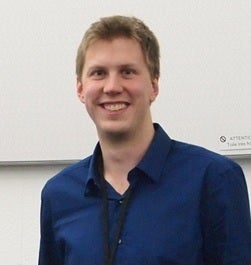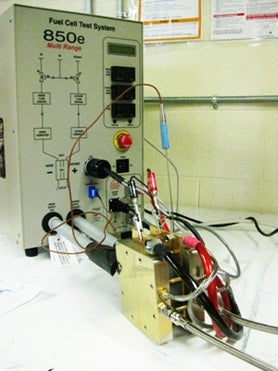
The University of Waterloo chemical engineering graduate (BASc, ’09; MASc, ’11; PhD, ’15) improved the catalysts that drive fuel cells — research CAGS calls “critical to Canada and to the world.”
For Higgins, creating better energy alternatives just makes sense. “We’ve got a crazy reliance on fossil fuels right now,” he says. “But it’s going to be hard to step away if we don’t have the technologies that are affordable and that work well.”
He chose to focus on fuel cells: a promising green technology that converts chemical energy into electricity by mixing hydrogen and oxygen.

Under the supervision of Zhongwei Chen, Canada Research Chair in Advanced Materials for Clean Energy, he developed an alloy that slashed the use of platinum. And rather than simply match the performance of current catalysts, it actually proved seven times more effective.
However, Higgins wasn’t satisfied with simply reducing platinum content. He continued his research, ultimately identifying half a dozen options that eliminated the precious metal entirely.
The resulting 60+ research papers have been cited more than 3,600 times to date. “His originality, perseverance and ability to think outside the box to create impactful solutions is everything we look for,” says CAGS President Dr. Brenda Brouwer.
Higgins credits much of his success to Chen and supportive lab mates. “Really, this was a team effort,” he says. “I’m very fortunate to have been in the right place at the right time and come up with some interesting results.”
Now he’s continuing his electrocatalysis work at Stanford as a Banting Postdoctoral Fellow, a post he stepped into with confidence. “I had so many good role models at Waterloo that taught me how to do effective research,” he says. “Waterloo did set me up for success.”
The CAGS/ProQuest Distinguished Dissertation Awards have been recognizing outstanding Canadian doctoral dissertations for more than 20 years. The judges look for work that makes significant, original contributions to the academic community and to Canadian society. There are two awards: one for engineering, medical sciences and natural sciences; and one for fine arts, humanities and social sciences. They include a $1,500 prize and an invitation to speak to the Canadian Association for Graduate Studies conference to be held this November in Toronto.